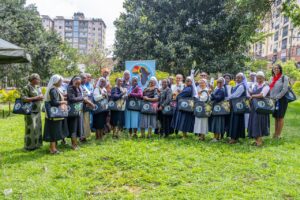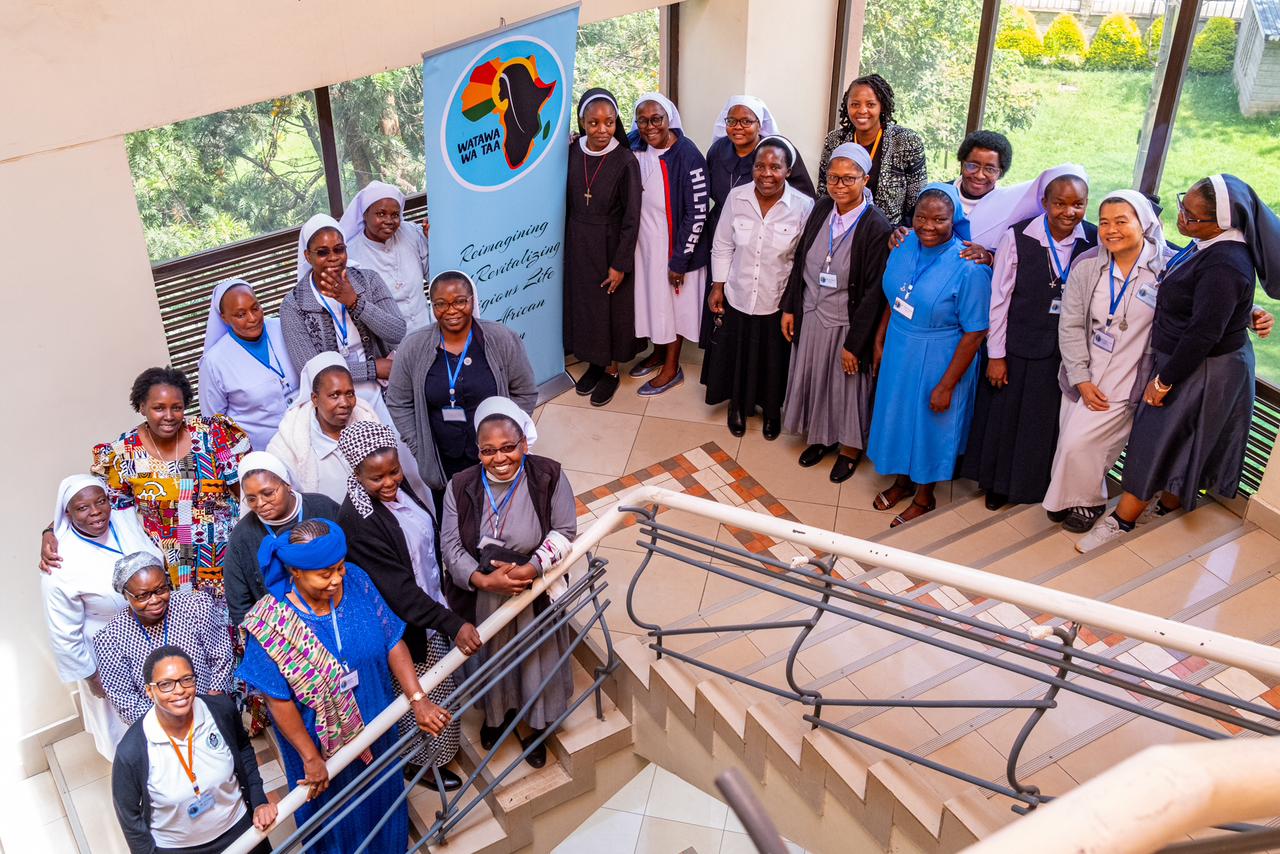By Paschal Norbert
DECEMBER 12, 2023 (CISA)– 21 religious sisters from 21 African countries gathered in Nairobi from December 4 to 7, 2023, for a historic meeting to launch a continental project christened Watawa wa Taa, loosely translated as ‘Consecrated Women of Light’ in Kiswahili.
Under the theme “Reimagining and Revitalizing Religious Life for African Women,” the religious women from across the continent and from different age groups spent time reflecting on their vocation and service to the people, speaking candidly about the joys and challenges of their religious calling in the three-day meeting they termed as ‘heart-warming’ and inspiring to the future generations of women who want to join religious life.
The project, a contrivance of Sr. Mumbi Kigutha, CPPS, a member of the Sisters of Precious Blood- Ohio and Sr. Jane Wakahiu, LSOSF, a member of the Institute of the Little Sisters of Saint Francis, Kenya, and the Associate Vice President, Program Operations and Head of Catholic Sisters at Conrad N. Hilton Foundation, aims to facilitate conversations that will help African women religious revitalize their way of life through discussions on the vows, formation, community life, and intercultural ministry.
According to Sr Mumbi, the Watawa wa Taa is a two-phased project that will involve having “conversations with sisters in various African countries on the things that are essential to religious life: formation, vows, and leadership. Thinking of how we make this life relevant to the African society in this day and age,” and also celebrate sisters with over 30 years in religious life who have committed their lives to the service of humanity.

In an interview with CISA, she explains “Congregations in Africa have been doing wonderful work for so many years. However, times have changed. But because of the business of our lives, sometimes we have not had the time to pause and reflect and see if we are still doing the things as we should do them. Are we responding to the needs of the society? Because many apostolic, actually all apostolic religious congregations were formed to respond to the needs of the society. We are creating a space for dialogue. What is unique is dialogue across different countries, sisters of different age groups from different congregations, which is not something that occurs often because many congregations have numbers. And in many ways, they’re very self-sustaining.”
“But what if we listen to one another? Because at the basis of religious life, we are all bound by the vows we take, which are similar. What is different are the expressions of how we live out this life through our charisms and spiritualities. So what would happen if sisters, about 10 to 12 in each country, would sit down for three hours every month around a particular topic and talk about it and see what is emerging? It is not just like theological or mental exercise, but it’s more of a spiritual exercise,” she adds.
The first phase of the project will also involve curating the shared experiences of sisters into a resource book, which will function as a tool to offer insight to different congregations on the emerging trends of today’s global world and challenge the current leadership and formation styles of religious women to correspond to today’s needs.
“Having been a sister for five years, what do you think now of the vows? How are they coming alive in your life for instance? What do you think of the models of leadership we employ? Are they life-giving? Are they sustaining? How do we do formation? How are we preparing women entering us in this day and age, who are very different from women who entered 20 or 30 years ago? How are we forming them to become sisters that can respond to the needs of society? So that is phase one, and this is why we gathered here. It was to train these sisters, 21 of them from 21 countries, in how to do focus group discussions. How do you facilitate a conversation and get various voices to speak while honouring the opinion of everyone and not trying to convict them your ways,” expounds Sr Mumbi.
She explains, “It is also a research because in the end, we hope to then use qualitative research to crunch all this information and see what major trends are emerging across the continent and perhaps offer it as food for thought for sisters and congregations and sisters in leadership to then say this is a tool that can help us reflect on our own life as a congregation and see the things that we either need to uphold, the things that we need to transform, the things we need to do better, but also affirm in what have we done well so far.”
Sharing her experience of the training, Sr Pulane Makepe, CP, a member of the Sisters of the Cross and Passion from Botswana said her motivation to take part in the project is because it acknowledges the contribution of religious sisters in Africa from all ages.
“This is the first time that we have generations of African women who have answered the call from all over the continent. And there’s just a very unique perspective of our experiences, our voices. And now we can actually have a voice to tell our story, not just to tell our story, but to tell each other our stories and all the things that we want to change because we recognize that we have those generations and talk openly,” says Sr Pulane.
“One of the things I loved was that our training talked about listening, how we all listen to hear what we think we heard. So we listen to respond, and then we listen to understand. And now we were being invited to listen to ignite. So to ignite each other’s dreams, like you see that a sister is not finishing her thought and you are like sister, where do you want to land,” she adds.
Despite their unique ability to transform lives as committed leaders and advocates for the communities they serve, Catholic Sisters have for many years not been recognized or celebrated as much for their hands-on ministries and partnerships that bring dignity and hope while significantly improving the lives of youth, families and communities around the world, particularly those who are on the margins of society.
Phase two of this project, which is called the ‘Living Ancestors’, a brain-child of Sr Wakahiu intends to bridge this gap and will identify and celebrate Catholic Sisters in Africa who have over 30 years in religious life for the strides they have made in impacting different communities across the continent.
“When we think back to the sisters who entered many years ago, many of them came in at a time when congregations did not have many resources, but yet with those limited resources so many of them were able to do transformative work on our continent, but those stories have never been told,” says Sr Mumbi, adding “We want to celebrate them while they are still alive and that’s why that project will be called Living Ancestors. We want to tell these stories for them and the rest of us. We who are starting out in religious life to be inspired, encouraged and challenged about how these women who have maintained this heritage for us lived out their lives in fidelity and love and joy. We are also doing that with sisters from all over Africa, where they get to tell their story in their own words.”
According to Sr Mumbi, the purpose of sharing these stories is to open their world so that other sisters from different congregations across the continent can learn from one another and also challenge each other on ways of living out their charisms to respond to the current needs of the communities they serve.
“The first 30 stories will be published in an open-source book that anybody can download and read free of charge. But we want to keep collecting stories because for sure there are more than 30 sisters who have done wondrous things. Through social media and our website, people can have a resource they can access and read about different sisters who have been pioneers in their field, and who have been innovative in their field. But most of all, how have they led out this life faithfully,” she states.
